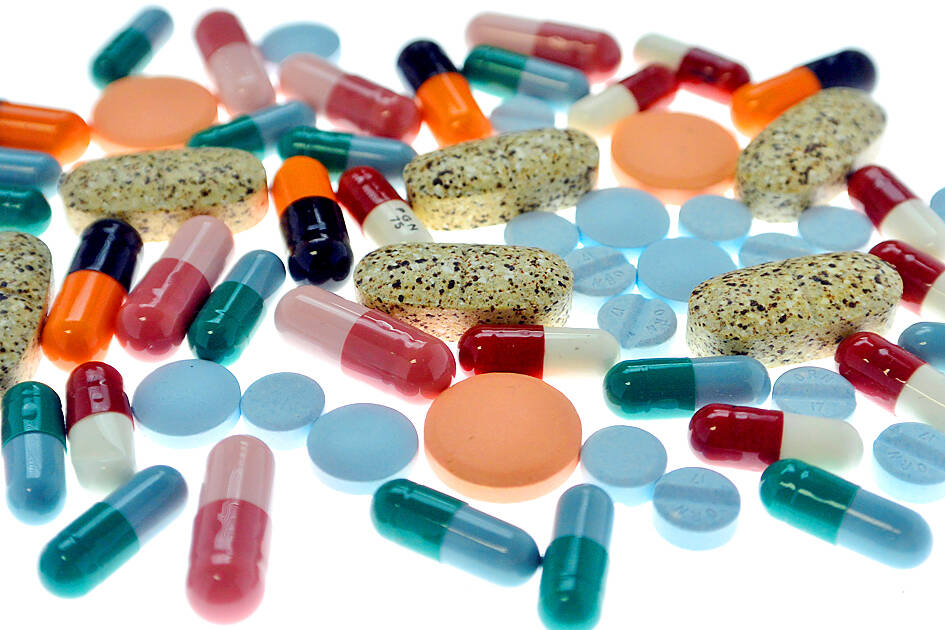PharmaEssentia Corp (藥華醫藥) yesterday said that it has applied for marketing approval for its ropeginterferon alfa-2b drug with the China National Medical Products Administration.
The company seeks approval to use the treatment for a rare type of blood cancer, polycythemia vera, it said in a regulatory filing.
The interferon drug, sold in the US under the name Besremi, is the only approved first-line treatment for polycythemia vera, with its sole competitor being the US-based Incyte Corp’s Jakafi, which has been approved as second-line treatment.

Photo: Reuters
The drug has gained approval to be used in the treatment of adult polycythemia vera patients in Taiwan, Switzerland, Israel, South Korea, the US and the EU.
The company in October said that it was targeting China and Japan as the drug’s next markets.
PharmaEssentia did not specify the estimated date of completion for the marketing application, saying in the filing that it is subject to the Chinese agency’s procedures for case acceptance.
There are about 400,000 polycythemia vera patients in China, the company added.
Polycythemia vera is a chronic, progressive myeloproliferative neoplasm, and it is primarily characterized by a high count of red blood cells, PharmaEssentia said.
The blood disorder could result in cardiovascular complications, such as thrombosis and embolism, and often develops into secondary myelofibrosis or leukemia, it said.
Besremi is PharmaEssentia’s most significant product, helping boost its revenue 383.44 percent year-on-year to NT$2.63 billion (US$85.65 million) in the first 11 months of last year, company data showed.
The company reported a net loss of NT$1.22 billion in the first three quarters of last year, due to higher marketing, management, and research and development costs.
That translated into losses per share of NT$4.37, company data showed.
Analysts said the new drug would lead to robust sales growth and operating leverage in the long term.
The company is also conducting a phase 3 clinical trial for the drug to treat essential thrombocythemia, a rare disorder in which the bone marrow produces too many platelets.
PharmaEssentia yesterday in a separate filing said that it has received positive opinions from the Data and Safety Monitoring Board for the trial.
The board comprises independent experts who review clinical study data for new drugs.
It confirmed the safety of the trial and recommended that the firm continue conducting it according to protocols, PharmaEssentia said.
Essential thrombocythemia is a myeloproliferative neoplasm characterized by an overproduction of platelets in the blood resulting from a genetic mutation.
The number of people with essential thrombocythemia is similar to those with polycythemia vera, the company said.
PharmaEssentia has registered 90 percent enrollment for the trial and plans to complete it as soon as possible, it added.
The company’s shares rose 62.8 percent last year, closing at NT$477 on Friday in Taipei trading.
The stock last month joined MSCI Global Standard Indices after it made considerable gains last year, global index provider MSCI Inc has said.

‘SWASTICAR’: Tesla CEO Elon Musk’s close association with Donald Trump has prompted opponents to brand him a ‘Nazi’ and resulted in a dramatic drop in sales Demonstrators descended on Tesla Inc dealerships across the US, and in Europe and Canada on Saturday to protest company chief Elon Musk, who has amassed extraordinary power as a top adviser to US President Donald Trump. Waving signs with messages such as “Musk is stealing our money” and “Reclaim our country,” the protests largely took place peacefully following fiery episodes of vandalism on Tesla vehicles, dealerships and other facilities in recent weeks that US officials have denounced as terrorism. Hundreds rallied on Saturday outside the Tesla dealership in Manhattan. Some blasted Musk, the world’s richest man, while others demanded the shuttering of his

TIGHT-LIPPED: UMC said it had no merger plans at the moment, after Nikkei Asia reported that the firm and GlobalFoundries were considering restarting merger talks United Microelectronics Corp (UMC, 聯電), the world’s No. 4 contract chipmaker, yesterday launched a new US$5 billion 12-inch chip factory in Singapore as part of its latest effort to diversify its manufacturing footprint amid growing geopolitical risks. The new factory, adjacent to UMC’s existing Singapore fab in the Pasir Res Wafer Fab Park, is scheduled to enter volume production next year, utilizing mature 22-nanometer and 28-nanometer process technologies, UMC said in a statement. The company plans to invest US$5 billion during the first phase of the new fab, which would have an installed capacity of 30,000 12-inch wafers per month, it said. The

MULTIFACETED: A task force has analyzed possible scenarios and created responses to assist domestic industries in dealing with US tariffs, the economics minister said The Executive Yuan is tomorrow to announce countermeasures to US President Donald Trump’s planned reciprocal tariffs, although the details of the plan would not be made public until Monday next week, Minister of Economic Affairs J.W. Kuo (郭智輝) said yesterday. The Cabinet established an economic and trade task force in November last year to deal with US trade and tariff related issues, Kuo told reporters outside the legislature in Taipei. The task force has been analyzing and evaluating all kinds of scenarios to identify suitable responses and determine how best to assist domestic industries in managing the effects of Trump’s tariffs, he

Taiwan’s official purchasing managers’ index (PMI) last month rose 0.2 percentage points to 54.2, in a second consecutive month of expansion, thanks to front-loading demand intended to avoid potential US tariff hikes, the Chung-Hua Institution for Economic Research (CIER, 中華經濟研究院) said yesterday. While short-term demand appeared robust, uncertainties rose due to US President Donald Trump’s unpredictable trade policy, CIER president Lien Hsien-ming (連賢明) told a news conference in Taipei. Taiwan’s economy this year would be characterized by high-level fluctuations and the volatility would be wilder than most expect, Lien said Demand for electronics, particularly semiconductors, continues to benefit from US technology giants’ effort